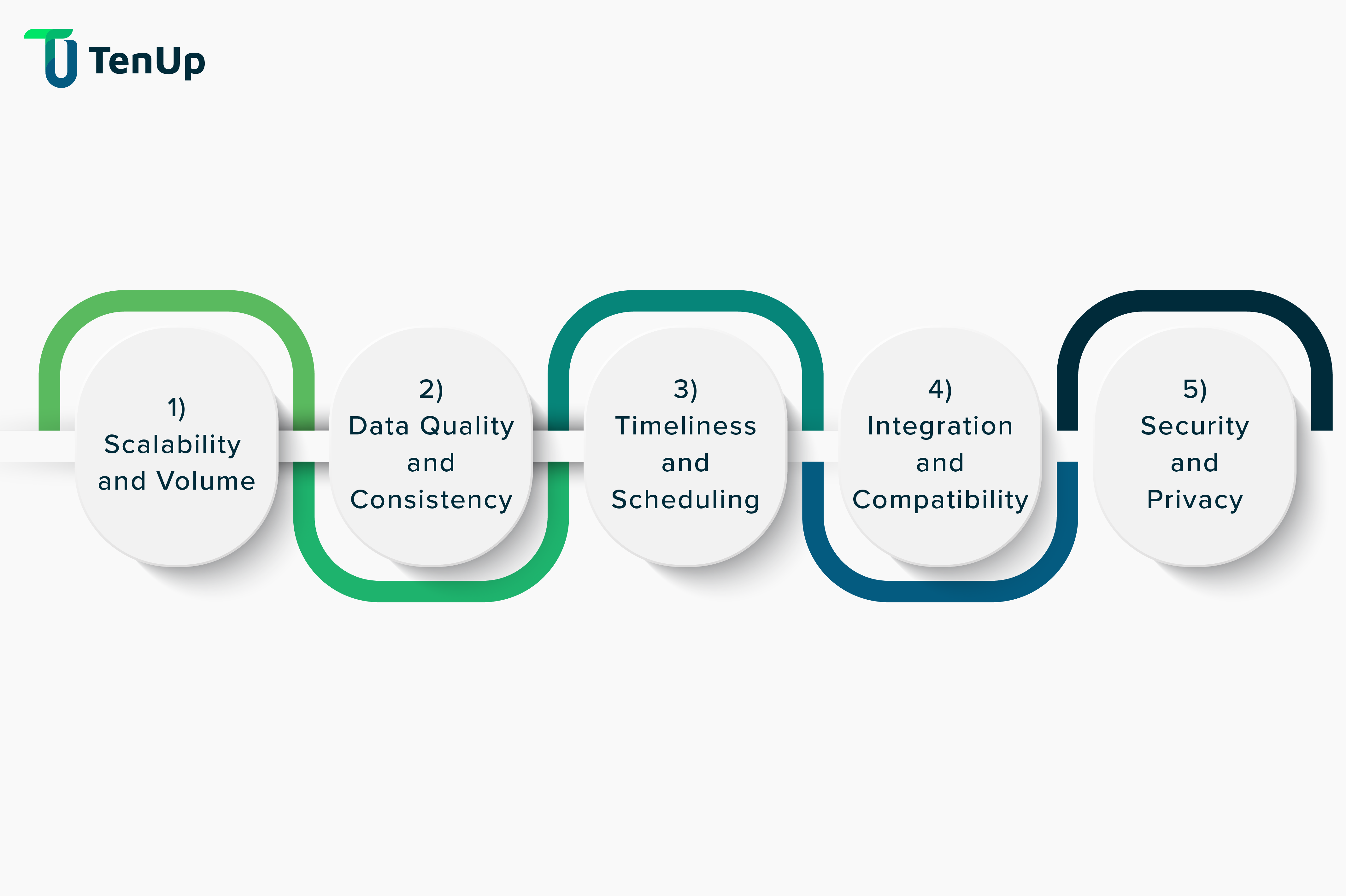#DataEngineering#Pipelines
In today's data-driven world, organizations generate massive amounts of data from various sources, such as databases, APIs, files, and streaming platforms. This data's efficient and timely ingestion is crucial for businesses to maintain up-to-date information and gain real-time insights. However, managing daily data ingestion and transfers can be complex and challenging due to several factors.
In this article, we will explore the challenges faced in managing data ingestion and transfers, focusing on data integration platforms, and discuss how businesses can overcome these challenges to ensure a smooth data flow across their systems.


Daily data ingestion involves continuously collecting and ingesting data from various sources, such as databases, APIs, files, and streaming platforms. This process enables organizations to capture real-time or near real-time data updates, ensuring that the most recent information is available for analysis and decision-making.
Data transfers enable data movement between different systems, databases, or applications. Whether transferring data from an operational database to a data warehouse or synchronizing data across multiple systems, efficient data transfers are crucial for maintaining data integrity and ensuring its availability when and where it is needed.
Ensuring smooth data transfers across different systems and accurate data ingestion from multiple sources on a daily basis is a highly complex task. It can get really challenging if not managed correctly. Here are some of the common challenges that organizations usually face:

Scalability and Volume: As businesses grow and data volumes increase, scalability becomes a significant challenge. Traditional data ingestion and transfer methods may need help handling the volume of daily data generated. Scalability issues can result in delays, data loss, and system bottlenecks. To overcome this challenge, organizations need robust data integration platforms that can scale seamlessly with their growing data needs. These platforms should offer high-performance data ingestion and transfer capabilities, allowing businesses to process large volumes of data efficiently.
Data Quality and Consistency: Maintaining data quality and consistency is vital for accurate insights and decision-making. However, data from different sources may have inconsistencies, missing values, or errors. Precise only or complete data can lead to correct analysis and flawed decision-making. Data integration platforms are crucial in addressing this challenge by providing data validation and cleansing features. These platforms enable businesses to implement data quality checks, perform transformations, and ensure that the ingested and transferred data is accurate and reliable.
Timeliness and Scheduling: In today's fast-paced business environment, timeliness is critical. Businesses require real-time or near-real-time data to make informed decisions. Managing the timely ingestion and transfer of data poses a challenge due to data source availability, system constraints, and processing delays. Data integration platforms offer scheduling and workflow automation capabilities to address this challenge. These features enable businesses to define and automate data ingestion and transfer processes, ensuring that the data flows into the systems as per predefined schedules.
Integration and Compatibility: Organizations often have diverse technology landscapes with multiple systems, databases, and applications. Ensuring seamless integration and compatibility between these components can be a challenge. Different methods may use other data formats, protocols, and APIs, making data transfers complex. Data integration platforms provide connectors and adapters that facilitate seamless integration between various systems and ensure compatibility during data ingestion and transfers. These platforms enable businesses to bridge the gap between different technologies, simplifying the data integration process.
Security and Privacy: Data security and privacy are critical considerations in data ingestion and transfers. When data flows across systems, it is vulnerable to unauthorized access, breaches, or data leaks. Businesses must ensure that the data remains secure and protected throughout the entire data integration process. Data integration platforms offer robust security features, including encryption, access controls, and compliance measures. These features help organizations secure their data during ingestion and transfers, ensuring confidentiality, integrity, and compliance with data protection regulations.
Data integration platforms are instrumental in overcoming the challenges of managing daily data ingestion and transfers. These platforms offer a range of features and capabilities that enable businesses to streamline their data integration processes effectively. By leveraging data integration platforms, organizations can:
Achieve Scalability: Data integration platforms provide scalable infrastructure and high-performance data processing capabilities, allowing businesses to handle large data volumes efficiently.
Ensure Data Quality: Data integration platforms offer data validation and cleansing features that help maintain data quality and consistency, ensuring accurate insights and decision-making.
Enable Timeliness: Data integration platforms enable businesses to automate data ingestion and transfer processes, ensuring timely data availability for analysis and decision-making.
Simplify Integration: Data integration platforms provide connectors and adapters that facilitate seamless integration between different systems, databases, and applications, simplifying the data integration.
Enhance Security: Data integration platforms offer robust security features, including encryption, access controls, and compliance measures, ensuring the secure transfer of data across systems.
To effectively address these challenges, organizations can leverage cloud data engineering tools, which offer scalable solutions for data processing and integration. For more insights on how these tools can enhance your data management strategies, check out our blog on Benefits of Cloud Data Engineering Tools for Scalable Data Processing.
Managing daily data ingestion and transfers across system landscapes can be complex for businesses. However, with the right data integration platforms in place, organizations can overcome these challenges effectively. Data integration platforms provide scalable, secure, and efficient solutions for managing data ingestion and transfers. By leveraging these platforms, businesses can ensure a smooth data flow across their systems, enabling accurate insights, informed decision-making, and streamlined operations.
Explore our end-to-end Data Engineering services, which include developing personalized data integration platforms and solutions tailored to meet your unique industry, niche, and business requirements.
Also, check out our case study titled, “Synergizing Analytics and Data Engineering”, where we build a custom solution for a warehousing giant to easily retrieve and ingest data coming from multiple acquired companies into a centralized system to facilitate analytics and business intelligence.
Want to overcome the challenges of managing daily data ingestion and transfers? Let's discuss how we can help streamline your process for smoother operations.